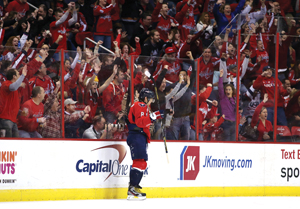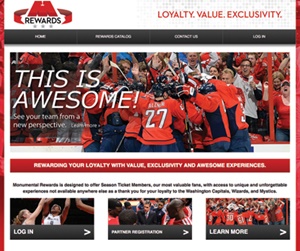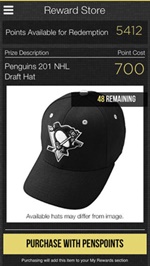New Year’s Resolution, 2014: Add value to season-ticket packages, encourage repeat attendance among single-game ticket buyers, and drive increased spending among customers across merchandise, concessions and experiences.
If your resolution looks anything like this, chances are you might look to a loyalty or rewards program.
Following the trend set by retailers, travel companies, restaurants and other consumer service providers, sports properties are now offering loyalty programs and rewards programs to various customer groups. Organizations may wish to think carefully about what they offer within these programs, both for maximum impact and so not to unnecessarily give away the farm.
Before looking specifically at what can and should be a part of loyalty and rewards programs, realize that they are not the same thing. Rewards programs encourage behaviors, while loyalty programs encourage loyalty. Loyalty by definition is not a behavior, but a “feeling of strong support for someone or something.” Organizations need to decide if they are cultivating feelings or compensating behavior.
■ Loyalty programs
Loyalty is the most vague word in marketing. What makes someone loyal? Can someone be loyal to a brand but shop competitors? No brand truly can or should expect any one consumer to consistently devote 100 percent of his or her investment, nor can a brand expect 100 percent of its consumers to maintain a high level of spending and engagement. Even if brand affinity remains high, life changes can render a brand obsolete. (I can’t go to my local dry cleaner if I move from New Jersey to Texas.)
Loyalty in sports is even trickier. I’ve suggested that season-ticket holders represent the pinnacle of loyalty across the business world, paying up front for product before they know what the quality of the product will be. Research conducted through the department of recreation, sport and tourism at the University of Illinois at Urbana-Champaign and published in Science Quarterly details how transplanted sports fans tend to remain loyal to their hometown teams in an effort to protect their identity and reminisce. Feelings of loyalty run deep and provide much more to us than just someone to root for.
 |
Photo by: GETTY IMAGES
|
So why do teams need loyalty programs when, in many cases, customers already act super-devoted? Think of the programs as high-revenue insurance. It’s become Business 101 that proactively retaining current customers, especially higher-spending ones, offers better ROI than chasing new customers. Loyalty programs are generally designed such that loyal customers remain loyal, i.e., fans continue having positive feelings for the team. Loyalty programs in sports typically focus on season-ticket holders, since they account for so much revenue.
 |
Fans of the Capitals, as well as the Wizards and Mystics, can score points with the Monumental Rewards loyalty program, but only through consistent support.
|
Monumental Rewards, established in 2013, is an example of a well-crafted loyalty program. Washington Wizards, Capitals and Mystics season-ticket holders can become members and accrue points through typical ticket-holder activity such as ticket renewal, attending games and reaching tenure milestones. Points can be redeemed for VIP-like experiences, memorabilia and offers. The key here is that while the rewards are somewhat transactional, gaining them comes only through consistent support of the Monumental teams. Since loyalty is a feeling, Monumental Rewards helps season-ticket members feel like a more important customer.
■ Rewards programs
The plethora of rewards programs available to consumers clearly supports any argument for their effectiveness. Subtle details can make rewards programs even more successful.
 |
|
 |
PensPoints allows Penguins fans of all types to get rewards.
|
I found the Pittsburgh Penguins’ reward program, PensPoints, to be a unique and entertaining system in this space. PensPoints provides Penguins fans and attendees of all types the opportunity to amass points that can be redeemed for rewards. A participant does not need to be a season-ticket holder, or a ticket holder of any kind, though attending Penguins games does account for substantially more reward points than watching a game on TV or listening on the radio.
A unique and well-designed feature of PensPoints, the program is self-administered by the participant through a smartphone app, scanning bar and QR codes or entering keywords into a phone, so that accounts update automatically. The result is an easy, interactive rewards platform that offers no pressure to participate but all the incentives to do so.
Multiple colleges have begun offering rewards for students who attend on-campus sporting events. Ole Miss in particular grants points to students who scan their IDs at varsity athletic events. Participants sign up at RebelRewards.com.
An idea that can make a rewards program more effective is the “endowed progress effect.” From the Journal of Consumer Research (Nunes & Dreze, 2006), the endowed progress effect suggests that a process deemed started but incomplete is more likely to be completed than one not yet started. Why does this matter? Think about your local sandwich shop, where after seven subs the eighth is free. Someone is more likely to buy those seven subs by using a card with 10 stamp areas, having the first two areas pre-stamped. The process is already “started,” leaving the customer compelled to finish it. The Sports Authority, when it launched its customer rewards program, The League, included a bonus $5 welcome reward for signing up, the type of kick-start Nunes & Dreze would advocate.
■ Keeping them all happy
As I’ve told many clients, students, and anyone else who will listen — let your objectives drive your methodology, and never vice versa. If a team or brand is saying “we need a loyalty or reward program,” its leaders should ask why. Any business could benefit from a well-executed loyalty program. Well-executed does not have to include compensating members for their loyalty, but should instead offer them the opportunity to feel good about being there.
Reward programs have a place too, but before rushing into one, a team should consider whether it has exhausted other methods of increasing traffic, attendance, sales, or whatever key indicator is of concern. Since reward programs often include giving up profit margin, it’s best to explore all ideas that keep margin in the team’s pocket before needlessly handing out cash.
Steve Seiferheld (steveseiferheld@turnkeyse.com) heads the custom research division of Turnkey Intelligence. Follow him on Twitter @SteveSeiferheld.








